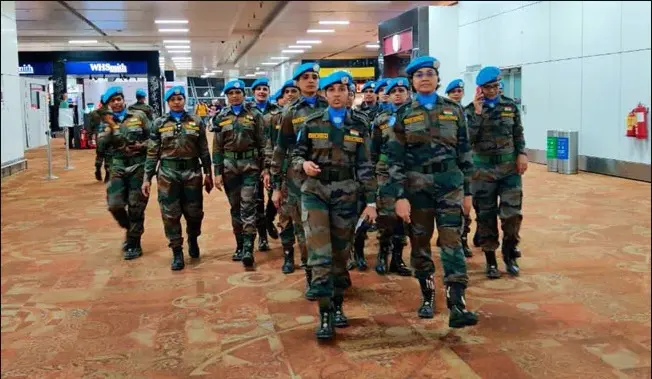India’s largest single unit of women Peacekeepers
India will deploy a platoon of women peacekeepers to UN Mission in Sudan. This will be India’s largest single unit of women Peacekeepers in a UN Mission since it deployed the first-ever all-women contingent in Liberia in 2007. The Indian contingent, comprising two officers and 25 Other Ranks, will form part of an Engagement platoon and specialize in Community outreach, though they will be performing extensive security-related tasks as well. The deployment in Abyei will also herald India’s intent of increasing significantly the number of Indian women in Peacekeeping contingents. The operation has been tasked with monitoring the flashpoint border between north and south and facilitating the delivery of humanitarian aid and is authorized to use force in protecting civilians and humanitarian workers in Abyei.
NOTABLY: As of October 31, 2022, India is the second largest contributor to UN peacekeeping missions with 5,887 troops and personnel deployed across 12 missions, after Bangladesh (7,017).
What is the U.N. Peacekeeping mission?
- The U.N. Peacekeeping mission is a joint effort between the Department of Peace Operations and the Department of Operational Support and aims to assist host countries to transition from situations of conflict to peace.
- The U.N. began its Peacekeeping efforts in 1948 when it deployed military observers to West Asia. The Peacekeeping mission’s role was to monitor the Armistice Agreement between Israel and its Arab neighbours.
- U.N. Peacekeepers provide security as well as political and peacebuilding support to conflict-ridden countries.
The three basic principles that guide U.N.’s Peacekeeping missions are:
- Consent of the parties
- Impartiality
- Non-use of force except in self-defence and defence of the mandate
Who are the ‘Blue Helmets’?
- Blue Helmets are the military personnel of the U.N. that work alongside the U.N. Police and civilian colleagues to promote “stability, security, and peace processes”. The personnel get their name from the iconic blue helmets or berets they wear.
- All military personnel under Blue Helmets are members of their national armies first who are seconded to work under the U.N. command.
- Currently, there are more than 70,000 military personnel enlisted as Blue Helmets. African and Asian countries outnumber their western counterparts in contributing soldiers to Blue Helmets.
What are the responsibilities of U.N. military personnel?
U.N. military personnel can be tasked with:
- Protecting civilians and other U.N. personnel
- Monitoring disputed borders
- Observing peace processes in post-conflict areas
- Providing security in conflict zones
- Providing security during elections
- Assisting in-country military personnel with training and support
- Assisting ex-combatants in implementing the peace agreements
How are Blue Helmets enlisted?
- Qualified military officers from U.N. member states are recruited to serve as individual staff officers, military observers, or as part of units from an individual troop-contributing country, by the United Nations Office of Military Affairs. Staff officers are also deployed at the U.N. headquarters from where they monitor all aspects related to the deployment of troops on the ground.
- Blue Helmets are seconded to work under the U.N. flag for periods normally of up to one year in the field, or two or three years at the headquarters.
- U.N. Peacekeeping has listed increasing the number of female military personnel as one of its top priorities.




